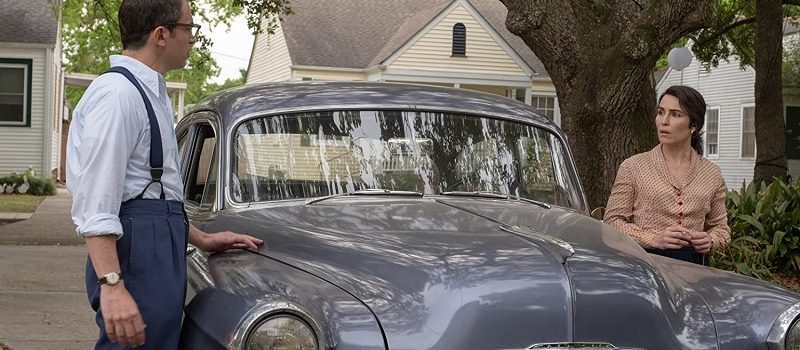There was a common thread that ran through the stars of The Secrets We Keep. We caught up with Rapace and writer-director Yuval Adler for a roundtable where something became immediately clear about the actress and her co-star, Joel Kinnaman.
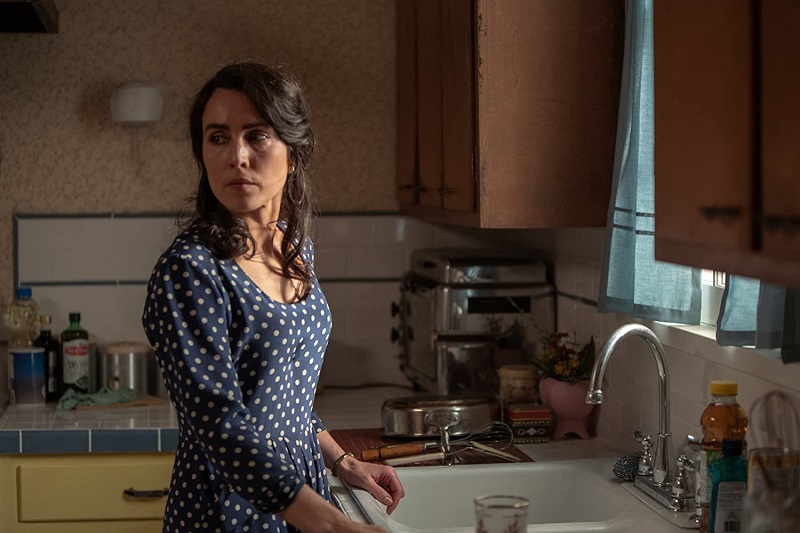
Rapace shared some personal demons she had concerning the entity that is revenge and if that drives you, once you achieve it—does it fill that hole in one’s heart? She and Kinnaman know each other from their native Sweden and a film they did previously that found The Secrets We Keep turning the tables. On the Child 44 set, it was Rapace who was tied to a chair while Kinnaman did the interrogating.
At the heart of their latest film is the story of a woman in post-World War II America who is convinced that she is living next door to a monster. She’s so sure that Kinnaman’s character is the wartime tormentor that she kidnaps him, ties him up in her basement, and tortures him. Turns out the tables have turned as the actor was now the one feeling uncomfortable as the actress did her best to break him.
From the filmmaker’s point of view, it was a fascinating experience. Most notably, he spoke volumes about his lead actor and how limiting being tied to a chair is to a performer whose body is one enormous tool in the actor’s toolkit. Both Rapace and Adler were open books and the roundtable evolved into one fascinating conversation about revenge, justice, and how that looks, depending on who’s eyes the subject is viewed.
Q: I like the idea of your character having everything clean and the perfect family on the outside. In the basement, below, there’s a nightmare going on. I think that’s a great metaphor for how people can be. Given the delicate material, did you ever experience anything like that where you as a professional had to present yourself as someone on the outside, but as an actor, you are processing so much more on the inside?
Noomi Rapace: All the time, I would say [laughs]. You come across as a normal person, but you are hiding all your madness and your insanity. Then, you meet someone equally as insane, like Yuval when we first met! It was two madmen meeting in New York. We started a conspiracy, let’s go into the madness and explore people that are on the edge. That is a great gift that you are given when you meet someone who is in your tribe… a like-minded person. You can talk about all these things. There’s nothing you need to hide. Noomi’s basement, there’s always stuff going on [laughs]. I gave Yuval the keys to my basement and he was looking into all the madness, craziness, the brokenness and sadness, desperation, and anger. I invited him. That’s OK because there’s no judgement when someone has that same mentality. I grew up in Sweden and people hide all kinds of things. It’s a society where “everything is normal here.” Nobody shows anything, and there’s a lot of craziness going on inside.
Q: Joel has said that those scenes in the basement were so tortuous, literally. Could you both talk about your own experience to shoot those scenes?
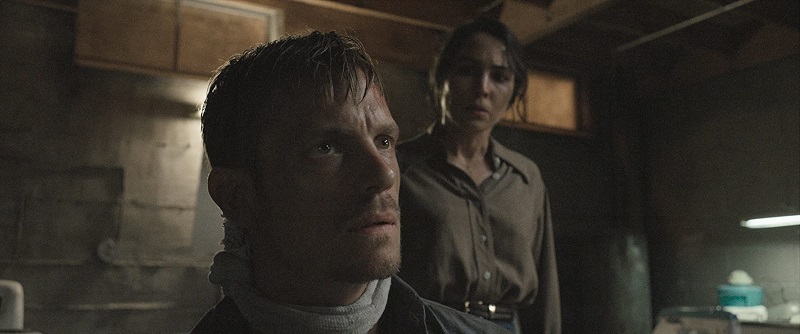
Yuval Adler: Joel had a very [tough] predicament. The actor not being able to move, that’s half of how they express himself. That’s 80-percent of the film. In the beginning, he was walking a lot, then he was tied up. It was hard. Of course, there’s something passive to it, which is what drew him to this thing. It is something different than the stuff that he usually does. Him and Noomi, on the set, were speaking Swedish to each other—to annoy me. Noomi is in every scene in the film. She has to portray something in the present and something in the past. She was in this emotional craziness that she was talking about. He came into, a week later, it and it took him a couple of days. Those first days, he was Mr. Cool Guy. Then he got into it, especially when we were in the basement. There’s something very intense to that. He was tied all day. It annoyed him.
Noomi Rapace: It was emasculating for him.
Yuval Adler: Yeah, in one sense he resented it, on the other hand, he played with that resentment.
Q: Mr. Adler, you have taken the most unique paths to this moment. Your vocational history includes math, philosophy, sculpture, photography—how did any of those elements factor in as you created this film?
Yuval Adler: When I make a film, I try to focus on what I’m doing at the moment. I actually am trying to make genre films. In that sense, this is a genre film. It has genre elements. For me, whether there is a correlation between other things I’m doing and this, that’s a question for when I’m old. I’m still young. I really don’t know. I still do philosophy, I’m writing, but it’s completely separate. It’s a different thing for me.
Q: Noomi, you and Joel have quite a history. How did this particular project come about for you two?
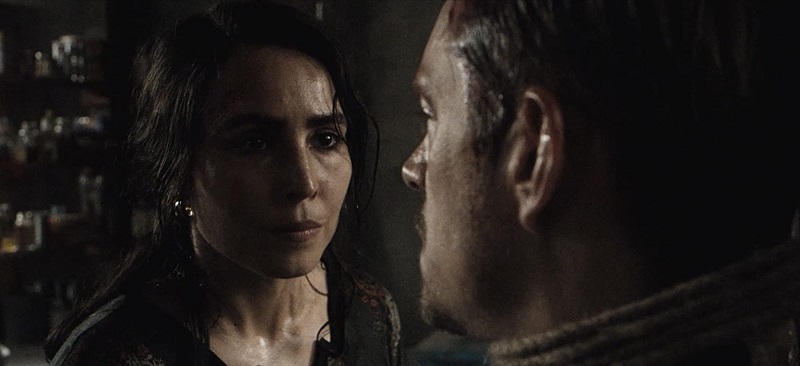
Noomi Rapace: We were trying to do a film together, we did one way back called Child 44 when I was tied up in a chair and he was circling around me and asking me about Tom Hardy’s character. I refuse to talk to him. He’s trying to seduce me and scare me and kept denying him access to me. There was this situation in this one take where I spat on him and he just looked at me and he swallowed it. I thought, “wow, I hate this man so much.” Then one day I knew we would be in the reverse situation. One day, he’s going to be in my chair! Then this script came across and I read it and I fell in love with the core question of forgiveness. We were attached way back when, but Joel was supposed to play my husband. I met a few directors. I didn’t find the right person. But when I met Yuval, when I was shooting Jack Ryan in New York, and we met in my hotel and he was so honest and so straight to the point and so direct and he knew so much about those issues and that exact question I wanted to ask. I called Joel and said, “this is it. We have found him.” Then Yuvan and me started this process and re-writing the script. Then Joel’s character husband became something else. Yuval said that Joel should be doing Thomas. It shifted. It hit him by surprise how emotionally hard it was for him.
Q: How did knowing Joel previously impact you preparing for the role?
Noomi Rapace: We knew each other really well, which makes it possible to not sugar coat things to be more direct. That’s why it became so emotionally undressed. We felt like we were naked in front of each other. We weren’t hiding anything. So many nights and days I thought I was losing my mind. I was breathing through a straw. He was in the same spot. It had this feeling that we were both drowning, and Yuval was holding us up, just enough. I think because we knew each other, we allowed ourselves to go to that extent because we trust each other.
Q: Something that really stands out is you are never clear on whose story is the truth. Yuval, can you speak to your responsibility to balance that?
Yuval Adler: The contradiction, the fact that you don’t know who to believe is the key to this story. When Noomi approached me about coming onto this project and rewriting it, that was not too long after the (Supreme Justice) Kavanaugh hearings. He was saying it wasn’t me. You can never go to the past and know what happened. There’s no other way than these two people playing it out and you making your mind. The fact that there’s no solution, that was what was so fascinating about it.
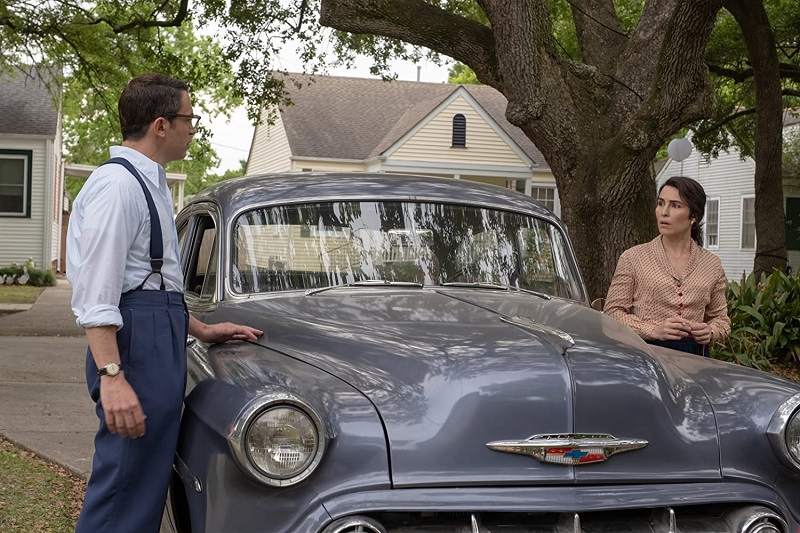
Q: What was the emotion that most stuck with you after first completing the script?
Noomi Rapace: I obsessed with revenge when I was younger. There was a few people, including a family member, that I was hurt by. I wanted to strike back on. I was convinced for many years that that was the way out of my emotional prison. When I read the script and that was exactly Maja’s question. Does it help? Can I cure my broken heart if I make him suffer as much as he made me suffer? That is the question we were battling through the movie. We shot the movie chronologically. One of the last days, Chris Mussina (who plays Lewis) was crying and a total mess—a moment of such brutal honesty in his eyes—I got my answer. It was “no.” No, it doesn’t work. I was wrong. That was the question I wanted to ask myself and I got the answer in the movie.

